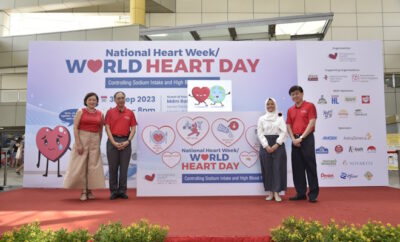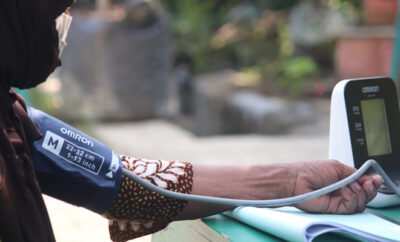
Health x Wellness
World Health Day 2019: Prevention is better than cure
By Alexis En, Regional Marketing Director, Omron Healthcare Asia Pacific
The 7th of April each year marks the celebration of World Health Day globally. Traditionally, the World Health Organization (WHO) drives awareness towards a specific health theme or focuses attention to a specific area of concern on this day.
One area of concern for us here at OMRON is the prevalence of high blood pressure, or hypertension, especially among people living in developing and developed countries. In a previous article, I shared seven tips on managing blood pressure. But it’s always good to remind ourselves how we can minimise our risk.
In Singapore, hypertension is most prevalent among people that are 40 and older. More than half, over 53 percent[1], of people aged between 60 and 69 years have hypertension, according to the Singapore Heart Foundation.
Data also shows that a higher proportion of men are hypertensive (26.4 percent) compared to women (20.7 percent) in Singapore. Additionally, hypertension is most prevalent among the Malays (28 percent), followed by the Chinese (23.4 percent) and Indians (19.3 percent).
As the population is ageing rapidly in Singapore, there is great urgency in pushing for better control and prevention of hypertension.
What exactly is high blood pressure or hypertension?
Blood pressure refers to the force with which our heart pumps blood throughout the body. Blood pressure varies from person to person. It also varies from time to time for everyone. For instance, blood pressure is normally higher when we are exerting ourselves physically compared to when we are relaxed.
There are two numbers we focus on when measuring blood pressure:
- Systolic pressure — Pressure with which the heart contracts and pumps blood to the rest of the body
- Diastolic pressure — Pressure registered as the heart relaxes and its chambers open, filling with blood
Blood pressure classification is explained in the table below. Blood pressure is measured in mm Hg (millimeters of mercury):
| Classification | Systolic (mm Hg) | Diastolic (mm Hg) |
| Normal | < 130 | < 80 |
| Pre-hypertensive | 130-139 | 80-89 |
| Hypertensive | ≥ 140 | ≥ 90 |
When a person’s blood pressure is consistently at or greater than 140/90 mm Hg, they are said to have high blood pressure or hypertension. Normally, this is after three to six blood pressure measurements over several months.
What are the health risks of hypertension?
Patients with high blood pressures are at increased risk of developing cardiovascular complications. Hypertension is also a major risk factor for coronary heart disease, stroke and atherosclerosis (the buildup of plaque in the arteries). High blood pressure puts extra strain on the heart and blood vessels, weakening or damaging them. Generally, the higher the blood pressure, the higher the risk of heart attack and stroke.
According to the Health Promotion Board in Singapore, a 2015 study has shown that 74 percent[2] of patients who have had heart attacks had hypertension as a risk factor. Other studies have linked high blood pressure to kidney disease, some forms of dementia, and even sight and mobility problems.
What can be done to prevent hypertension?
High blood pressure is sometimes called the ‘silent killer’ because people who are suffering from it often do not show obvious signs or symptoms. Also, there are many types of hypertension and some may be due to underlying medical conditions.
The challenge is the causes are unknown for most high blood pressure cases. Evidence suggests that hypertension can be caused by a combination of hereditary and lifestyle-related factors such as obesity, stress, and excessive salt intake. Pregnancy can be a factor as well.
![]()
Generally, hypertension can be lowered through medication. Weight reduction, regular exercise, and salt restriction are also essential control measures. Nonetheless, for hypertension that develops from ageing and genetics without any other underlying medical cause, once the condition is diagnosed it is lifelong and does not go away.
The best way to tackle hypertension is to prevent it in the first place.
Take charge now and monitor your blood pressure
At OMRON, we believe it is time that we all take control of our own heart health. Heart attacks and strokes are life-altering events, but they are actually preventable afflictions. We can take steps to reduce the likelihood of these events striking us or our loved ones.
We need to take control of our health by:
- Being more active. Walk instead of drive, take the stairs instead of the elevator, park further away and count steps to a healthier heart.
- Eating smarter. Try to find low-fat, low-sodium substitutes that also taste great. Along with potassium, found in bananas and carrots, they are nature’s best medicines for your heart.
- Kicking bad habits. Minimize alcohol and cigarette usage. If you are going to have a drink try red wine, which in moderation, is better for your heart.
- Managing stress. Stress is a normal part of life. But too much can increase the risk of heart disease. Relax by doing things you enjoy (yoga, gardening, reading, sleeping eight hours, etc.) and your heart will benefit.
- Changing our mindset. Instead of just ‘checking’ your blood pressure occasionally, really ‘monitor’ it. Knowing your blood pressure numbers on a daily basis can help you see a heart attack or stroke coming and allows you to take action to save your own life. There are also applications now that provide deeper insights into blood pressure trends and variations.
- Sharing healthy lifestyle information. Share tips and tricks on how to live healthier with people you care about. Encourage each other to take better care of their heart health.
There are many different types of home blood pressure monitors available. Family doctors can help us choose one to suit our needs and provide advice on how to use it. More importantly, we need to realize that we now have the technology and the tools to properly monitor our blood pressure at our convenience. Taking the first step to take charge of our blood pressure is a significant step towards caring for our heart health.
[1] Risk factors, Singapore Heart Foundation
[2] 5 things you need to know about hypertension, The Straits Times, 5 Dec 2017









